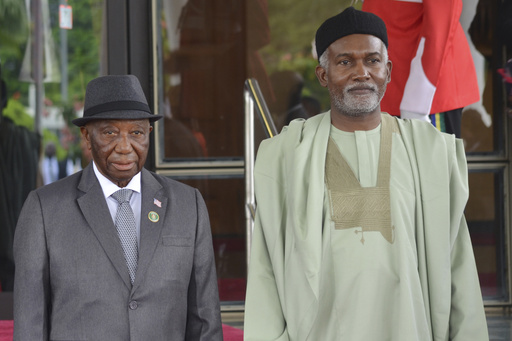DAKAR, Senegal — In a developing situation, South Sudan has agreed to take in eight migrants deported from the United States. Meanwhile, Rwanda is reportedly engaging in discussions with the U.S. regarding a similar agreement. Conversely, Nigeria has unequivocally rejected any external pressure to receive deportees.
Details remain sparse, but these efforts suggest a widening of U.S. strategies to deport individuals to countries other than their origin. Previously, the U.S. has relocated hundreds of Venezuelans and other nationals to Latin American nations like Costa Rica, El Salvador, and Panama. However, Africa, Asia, and Europe have yet to witness comparable major announcements.
The initiatives are seen by some as a mechanism to curb migration, which they consider overwhelming. On the other hand, human rights advocates argue against transporting migrants to nations where they have no ties and potentially face rights abuses. Notably, the U.K. Supreme Court ruled against a similar scheme to deport asylum-seekers to Rwanda last year.
In recent movements, President Donald Trump convened with several West African leaders at the White House. Discussions centered around migration, emphasizing the importance of countries reclaiming their nationals unauthorized to reside in the U.S., and the prospect of accepting deportees from other nations as well.
Tom Homan, a U.S. border official, conveyed optimism about forming agreements with “many countries” to accept these deportees. “If there’s a public threat or national security risk, rest assured, they won’t be staying here; we’ll send them to a stable third nation,” he stated.
West African leaders have weighed in on this matter. Liberia’s President Joseph Boakai remarked that while third-country nationals were a topic at the summit, Trump had not explicitly sought Liberia’s participation in receiving them. “There’s no obligation, but they wish for our support,” Boakai mentioned. Guinea Bissau’s President, Umaro Sissoco Embaló, confirmed the theme was indeed discussed but avoided commitments. Meanwhile, Nigeria’s Foreign Minister Yussuf Tuggar acknowledged ongoing discussions between U.S. and African nations but made it clear that Nigeria would resist these pressures, referencing existing domestic challenges.
Africa’s potential cooperation in such U.S. deportation initiatives may stem from interests tied to negotiations over issues like tariffs, U.S. aid reductions, or visa policies, which have negatively impacted African nations lately. Beverly Ochieng from Control Risks suggested potential agreements might soften adverse economic consequences. “In light of withdrawn developmental support,” maintaining good U.S. relations is critical, Ochieng expressed.
Currently, South Sudan stands alone in accepting third-country deportees from America, admitting eight deportees with criminal records, just one being South Sudanese. The deal specifics between the parties remain undisclosed. The South Sudanese Foreign Ministry has refrained from commenting. Alan Boswell of the International Crisis Group speculated South Sudan’s motives relate to wanting to soothe relations with the Trump administration amid visa considerations, sanctions, and diplomatic favor. Still, the decision faced local dissent, with civil society leader Edmund Yakani asserting, “South Sudan isn’t a disposal site for offenders.”
While Homan admitted to being uncertain about the eight deported individuals’ status, doubts concerning their safety and legal standing persist, as noted by Michelle Mittelstadt from the Migration Policy Institute. “People are concerned about the lack of clear authority over these migrants once they land in a third country,” Mittelstadt stated.
Rwanda’s foreign minister previously disclosed ongoing negotiations with the U.S. about potentially hosting deported migrants. However, further information is unavailable as the U.S. State Department declined comment, and rights groups have long criticized Rwanda for its human rights record, especially concerning the fatal detentions of supposed government critics.
In a related move, the U.K. had settled on a migrant agreement with Rwanda in 2022, intending to send undocumented arrivals there for asylum processing, permitting them to stay if approved. Legal issues and human rights protests have since stalled this plan.


